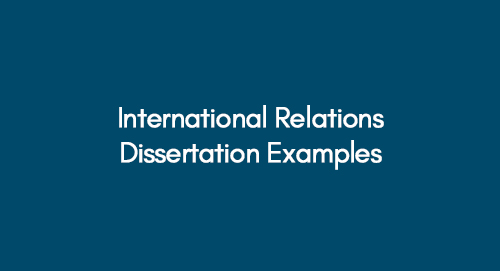
15 Amazing Auditing Dissertation Topics With Research Aims
May 2, 2023
175 Best Quantity Surveying Dissertation Topics in 2025
May 2, 2023International Relations (IR) is the study of the interactions between states and international organisations. It deals with issues such as war and peace, trade and economics, international law, diplomacy, and global governance.
It seeks to explain and understand the behaviour of authorities in the international system and identify patterns and trends in their interactions.
Students and researchers in IR develop theories and concepts to explain international behaviour, which helps craft strategies and policies to address global challenges. It seeks to understand the world and promote international cooperation and peace.
Get 3+ Free International Relations Dissertation Topics within 24 hours
Find Our Quality International Relations Dissertation Topics
Here are top international relations dissertation examples to assist students and researchers in drafting their high-quality research papers.
Example 1: The UK and its Trading Partners
Note: Below is a complete guide with some more examples and tips for you to ace the skill of dissertation writing in international relations.
What is International Relations Dissertation?
An international relations dissertation consists of an in-depth research project that explores a particular topic or issue related to international relations.
It is typically a substantial piece of original research of the degree that contributes to the existing body of knowledge in international relations.
The dissertation requires exploring a research problem, developing a methodology for investigating it, collecting and analysing data, and presenting findings. It covers various issues, such as international security, political economy, global governance, regional integration, conflict resolution, and diplomacy.
This international relations research demonstrates the student's ability to conduct original research and contribute to the field. It is an opportunity for students to showcase their analytical and develop expertise in a specific area of interest.
International Relations Dissertation Examples
Examples highlight the diversity of research interests within international relations. Here students get more unique and amazing international relations thesis examples for their research modules.
Bachelor Thesis International Relations Example
- The Role of the United Nations in Conflict Resolution: A Case Study of the Syrian Civil War
- The Impact of Globalization on Economic Development in Developing Countries
- The Rise of China and Its Implications for the International System
- The Role of Non-State Actors in International Environmental Governance
- The Impact of Immigration on National Security: A Comparative Study of Europe and the United States
- The Dynamics of Regional Integration in Southeast Asia: A Comparative Study of ASEAN and the EU
Master International Relations Dissertation Examples
- Exploring the Concept of Human Security: A Case Study of the Rohingya Crisis in Myanmar
- The Role of Soft Power in China's Foreign Policy: A Comparative Analysis with the United States
- The Impact of Cyber Warfare on International Security: A Case Study of the United States and Russia
- The Effectiveness of the Responsibility to Protect Doctrine in Preventing Genocide: A Case Study of Darfur
- The Politics of Climate Change: A Comparative Study of India and China's Approaches to Climate Governance
- The Future of Global Governance: A Critical Analysis of the United Nations and Its Relevance in a Changing World
PhD International Relations Dissertation Examples
- The Politics of Humanitarian Intervention: A Comparative Study of the United States and European Union Approaches
- The Role of International Organizations in the Promotion of Human Rights: A Case Study of the UN Human Rights Council
- The Impact of Globalization on State Sovereignty: A Comparative Analysis of Latin American and African States
- The Changing Nature of Security Threats in the Digital Age: A Critical Analysis of the Cybersecurity Challenge
- The Politics of Energy Security: A Comparative Study of Russia and the European Union
- The Future of International Order: A Critical Analysis of the Concept of Multipolarity
International Relations Dissertation Example: A Case Study
Topic: The Impact of Cyber Warfare on International Security: A Case Study of the United States and Russia
Abstract
This dissertation examines the impact of cyber warfare on international security. A case study of the United States and Russia to explore how cyber warfare operates and the implications for international relations. The study employs a qualitative research methodology, drawing on a range of primary and secondary sources to analyse the evolving nature of cyber warfare. It also examines its impact on key areas of international security, including military operations, espionage, and critical infrastructure protection. Through this analysis, the dissertation identifies key trends and challenges associated with cyber warfare. It highlights the need for states and other actors to develop effective strategies and mechanisms for managing this emerging threat. Overall, this study provides significant insights into the evolving nature of international security in the digital age and the challenges posed by cyber warfare to the stability and security of the global system.
Literature Review
The literature on cyber warfare and international security reflects the increasing recognition of cyberspace's strategic importance in international relations. Scholars highlight how cyber warfare achieves strategic objectives, including disrupting critical infrastructure, stealing sensitive information, and conducting propaganda campaigns. This literature review focuses on the key themes and debates within the existing literature on cyber warfare's impact on international security. One major theme that emerges from the literature is the need to define and conceptualise cyber warfare in a relevant way to study. Scholars emphasise the challenges of defining and categorising different cyber threats. These threats, from low-level hacking attempts to large-scale cyberattacks on critical infrastructure. Despite these challenges, the literature emphasises the need to develop a more nuanced understanding of cyber warfare, considering cyberspace's diverse strategies and tactics. Another major theme in the literature is the evolving nature of cyber warfare as evolving technologies and tactics are developed and deployed.
Methodology
This dissertation employs a qualitative case study methodology to explore the impact of cyber warfare on international security, with a specific focus on the United States and Russia. The study involves collecting and analysing data from a range of primary and secondary sources, including government reports, academic literature, news articles, and other relevant sources of information. The data collection process identifies key trends and patterns in cyber warfare use in the United States and Russia and the implications of these trends for international security. This method helps to provide information on cyber warfare issues, including state actors' motives and objectives, the tools and techniques used in cyber operations, and the impact of cyberattacks on critical infrastructure and other key targets.
Conclusion
The case study of the United States and Russia demonstrates cyber warfare's complex and evolving nature and impact on international security. One of the key findings of this study is that the United States and Russia are both active in cyber warfare to achieve strategic objectives. While their cyber operations' specific motives and targets may differ, both countries have demonstrated a willingness to engage in cyber warfare to gain a strategic advantage in international relations. This finding suggests that cyber warfare is likely to remain a key feature of international security in the years ahead. It also suggests that efforts to manage and regulate cyberspace will be critical to mitigating its potential risks and dangers. Ultimately, the findings of this study underscore the need for additional attention and investment in developing effective strategies and mechanisms for managing cyber threats. In addition, it promotes international cooperation and collaboration in addressing this critical issue.
Methodology for International Relations Dissertation Examples
Every topic for the dissertation is of different research nature and requires different methodologies to apply and reach a conclusion. Here, we provide an overview of the research methodology sections that help with different scenarios based on international relations dissertation topics. We focus on dissertations at the Bachelor's, Master's, and PhD levels, providing examples of how different levels of research can influence methodology choice.
Qualitative Methods for International Relations Dissertation
Qualitative methodology is an increasingly popular approach to studying International Relations. Qualitative research in international relations focuses on understanding social phenomena in their natural settings through observations, interviews, and analysis of texts and documents. Qualitative methods are particularly useful in IR research. This is because they allow researchers to understand better complex social processes and interactions between actors, including states, non-state actors, and international organisations.
Quantitative Methods for International Relations Dissertation
Quantitative methods are prominent approaches to studying international relations. These methods rely on numerical data and statistical analysis to identify patterns and test theories about relationships between variables. Quantitative research in international relations is particularly useful in international relations research because it allows researchers to analyse large datasets and test their theories using rigorous statistical techniques.
Conclusion
International relations is a vast field of study with numerous research questions and areas of interest. This write-up provides an idea of research topics and methodologies for researchers in the field, from the impact of cyber warfare on international security to the role of gender in peacekeeping operations. It also highlights the importance of rigorous research methods and techniques in producing valid and reliable results. International relations dissertation examples also offer valuable insights into the research practices and approaches. By examining these examples, readers can better understand international relations research's theoretical and practical aspects.





















